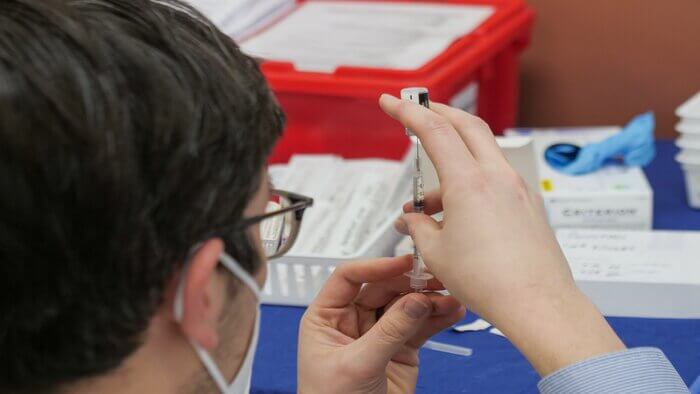How does Blockchain help Vaccine distribution?

- What are the challenges in the vaccine supply chain?
- How will Blockchain aid vaccine distribution?
- How would the Blockchain-enabled supply chain work for vaccine distribution?
- What benefits blockchain technology provide to vaccine distribution?
What are the challenges in the vaccine supply chain?
- Cold chain failure
Cold chain failure occurs when vaccines are exposed to a temperature outside the manufacturers’ storage recommendation. It is generally known that vaccines need to be stored at low temperatures, but vaccines must be kept in a recommended temperature range. It means that exposure to high temperatures is harmful, but even low temperatures can affect vaccines adversely. Low temperatures tend to freeze the vaccine and change its chemical composition, so it is no longer efficient. For example, if a vaccine needs to be stored between -2 degrees and +9 degrees, vaccines’ exposure below -2 or above +9 degrees will cause the vaccines to lose their potency. This failure to keep vaccines in the required range of temperature is referred to as Clod Chain Failure.
Furthermore, few vaccines require extremely low temperatures, such as Pfizer’s covid-19 vaccine needs a storage temperature of 70 degrees below zero, which makes it unfit for many hot countries. It is practically a challenge nearly impossible to achieve for hot and tropical countries to provide such a low temperature at every moment in the supply chain.
- Expired products
The expiration of vaccines is an undeniable challenge; governments generally buy vaccines in bulk, maybe around 10 million doses in a single purchase. There is a high probability of about 2 to 3 million vaccines getting expired while sitting in warehouses.
- Counterfeit products
It is tough to control the production, sale and existence of counterfeit products in the market. The injection of any fake vaccine can be life-threatening. In the current scenario, when the vaccine for Covid-19 is set to release, the fear of counterfeit vaccines may generate hesitancy among people to adopt the vaccine.
- Unavailability of enough resources
Vaccine distribution needs to be done on a large scale that will require a massive amount of resources for its development and distribution. If we talk about the covid-19 vaccine, two doses of vaccine are needed for 7 billion people worldwide, i.e., 14 billion doses. You can now imagine the number of resources that’ll be involved (14 billion syringes, dedicated healthcare workers for every region, suppliers, etc.). Therefore, the availability of resources becomes a tough challenge.
How will Blockchain aid vaccine distribution?
Of course, the distribution system and network are highly robust today. Still, every vaccine is different and is likely to present challenges of its own. Blockchain, a distributed ledger technology, can provide solutions to all the challenges involved and prove its effectiveness in vaccine supply chain management. Let’s see how Blockchain aids vaccine distribution.
- Intelligent Supply Chain
Blockchain helps to gain an accurate view of inventory positions and optimize vaccine allocation. A supply chain bolstered by Blockchain will help to identify early warning signs of interference from external data, manage inventory prioritization and reallocation and optimize orders based on critical needs.
Consider the problem of detecting defective vaccines. An audit or an inspection of inventory would reveal the number of expired vaccines, but it won’t reveal defective pieces or even explain the defect’s cause. Those can include glitches in any part of the supply chain, inefficient inventory management upstream or any other factor. When Blockchain-enabled record keeping is used, components such as inventory units, orders, etc., are given digital tokens. Moreover, Blockchain participants are given digital signatures to sign the blocks they add to the Blockchain. Each step in the transaction involving inventory flows, information flows and financial flows is recorded as the transfer of the corresponding token from one participant to another. In this way, Blockchain enables complete traceability and helps to detect defectives in the inventory to trace back to the source causing the defect.
Therefore, Blockchain transforms the supply chain into an intelligent supply chain that can trace faulty products’ provenance, identify suppliers involved with them, determine the associated shipment batches, and efficiently recall all of them. Moreover, for perishable products like vaccines and certain drugs, Blockchain lets the stakeholders automatically monitor the quality. IoT-enabled refrigerated container monitors the temperature continually and reports and records the unsafe fluctuations on the Blockchain. Additionally, if a retailer is concerned about the authenticity of delivered vaccines, he can always verify by backtracking because counterfeit vaccines would lack verification history on the Blockchain.
- Mass production and distribution
By recording and analyzing every stage in vaccine production and distribution chain, Blockchain enables facilities to streamline processes and adjust workflows based on supply chain disruptions. A blockchain-enabled supply chain is more equitable; it helps distribute the vaccine to everyone with equal priority and does not favor those who control the production or fund the vaccine.
Here is a simple illustration of a problem related to the production of vaccines that Blockchain addresses efficiently. Consider vaccine A, which is manufactured using C1 and C2 and vaccine B, which is developed using C1 and C3. The problem of excess inventory and out-of-stock inventory could rise here concerning component C1. Manufacturers of vaccine B may be piling up the stock of C1 while the manufacturer of vaccine A may be in the shortage of the inventory of C1. A practical solution for such a problem is to share the inventory flows on the Blockchain and allow each manufacturer to make their own decisions using complete information. Companies could use the kanban system to assign orders to each other and manage production efficiently. Blockchain will record digital tokens in the representation of kanban cards that are assigned to every produced item. This way, Blockchain enables both parties to make better-informed decisions and increase production manifolds.
- Data Collection
Blockchain collects data at every step and provides clear visibility of vaccines’ journey from start to finish. Data from the manufacturer, transport agency, partner airport, country warehouse and every other storage of vaccines is collected, which is verifiable by anyone at any moment. Such a system provides complete transparency, helps to identify errors and ultimately builds trust among the consumers.
How would the Blockchain-enabled supply chain work for vaccine distribution?
Stakeholders involved in vaccine production and distribution:
- Suppliers
- Manufacturers
- Logistics provider
- Distributor
- Healthcare Organizations (HCOs)
- Public
Step 1: Manufacturer places order for raw materials
The manufacturer receives a purchase request from a distributor. He then accepts the purchase request and contacts suppliers to accomplish the requirement of raw ingredients to produce vaccines. The agreement between supplier and manufacturer is written into a digital standard operational contract, i.e., Smart Contract.
A smart contract between supplier and manufacturer could state:
- Cost of raw materials as part of a specific order
- Penalty and bonus clauses
- Timescales of supplying the items
- Payment terms for settling invoices.
The information added by the supplier and manufacturer is saved to the Blockchain. Once the information is added, the Blockchain generates a hash ID associated with the added information that can be used for tracking transactions. This hash value can never be altered, providing security and integrity of data.
Step 2: Supplier packs the raw ingredients with RFID code
The supplier provides the raw ingredients to the manufacturer required for the production of vaccines. Every vaccine is packed with a unique RFID (Radio Frequency Identification) code that is traceable by anyone at any time.
Step 3: Manufacturer creates shipment and assigns it to the logistics service provider
Once the vaccine production is completed, the manufacturer packs the shipment with a QR code and sends it to the logistics for further processing. The smart contract between the manufacturer and the logistic provider could include:
- Cost of delivery
- Penalty for damaged vials of vaccines
- Invoice settlement
Step 4: Logistic Provider delivers the order to the distributor
The IoT-enabled logistics provide a significant benefit of tracking and analyzing the storage environment of vaccines. The IoT sensors are embedded in vaccine cooling pallets and a communication module to collect and share data on temperature, light and humidity. This information is shared with the vaccine distribution authority to track and verify the product.
Step 5: Distributor verifies the vaccines and forwards them to HCOs
After receiving the delivery, the distributor verifies the vaccines for their quality and effectiveness and forwards the shipment to the concerned healthcare organization. The distributor updates the information about shipment quality stored in the Blockchain, accessible to everyone.
Step 6: Healthcare workers provide vaccination to the public
Finally, the HCO, after receiving and verifying the vaccines, hands over the vaccines to healthcare workers who are appointed to provide vaccination to the people. The Blockchain offers people the facility to trace back the vaccine to know its source and quality standards. People can verify the expiration date and check for proper management of the vaccines throughout the production and distribution journey. It ensures the efficiency of the vaccine and helps to build trust among people.
What benefits blockchain technology provide to vaccine distribution?
- End-to-end traceability
Blockchain enables real-time visibility of vaccine distribution and provides the chain of custody from manufacturing to administration, removing blind spots across public and private entities.
- Reduced risk
Proactive identification and detection of supply chain risks, fraud, spoilage and other unexpected occurrences help deliver the vaccines readily.
- Safety and efficacy assurance
Regular environmental monitoring of storage conditions and transport and quick recall traceability will help ensure efficacy and build trust.
- Quality control and waste reduction
The storage and transit of vaccines often lead to a considerable percentage of losses- due to distribution issues, spoilage or supply chain losses. Blockchain allows tracking of each vial of vaccine efficiently, mitigates risks and optimizes quality control.
- Collaborative Development
Researchers and doctors worldwide are coming together and taking a collaborative approach to tackle the covid-19 pandemic. Blockchain becomes a single reference point to share and distribute data identified every moment on such a global scale. Moreover, the immutability of Blockchain ensures authenticity and makes it a ledger of truth.
Despite various challenges, Blockchain has proved its worth in vaccine distribution. Organizations and concerned stakeholders worldwide understand the importance of Blockchain and are prepping to build an utterly transparent vaccine production and distribution system leveraging Blockchain.
If you’re looking to transform your vaccine supply chain with Blockchain, we are ready to help you. Consult our team of blockchain experts and discuss your requirements.
Start a conversation by filling the form
All information will be kept confidential.
Insights
Generative AI for Regulatory Compliance: Benefits, integration approaches, use cases, best practices, and future trends
Generative AI is reshaping the field of regulatory compliance by enhancing risk management, boosting operational efficiency, and improving compliance monitoring.
Generative AI for marketing: Overview, use cases, integration strategies, and future outlook
Generative AI is transforming the marketing landscape by enhancing content creation, customer interaction, and data analysis.
Generative AI in due diligence: Integration approaches, use cases, challenges and future outlook
Generative AI is reshaping the due diligence landscape, establishing new data analysis and processing benchmarks.












